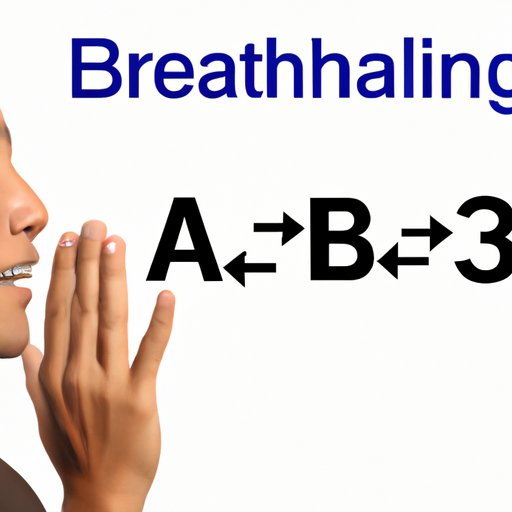
Introduction
Breathing is a fundamental process of the human body. It keeps us alive, nourishes our cells with oxygen, and removes carbon dioxide. Holding your breath is a fascinating aspect of human ability that many people find intriguing. Breath-holding techniques have been practiced for centuries and are essential for activities such as swimming, diving, and freediving.
In this article, we’ll explore techniques and tips to help you hold your breath longer by improving your lung capacity. Holding your breath longer can provide many benefits, including increased oxygen supply to your organs and muscles, a calm mind, and performance enhancement for various activities.
Understand Proper Breathing Techniques
Before attempting to hold your breath, one must understand proper breathing techniques. The benefits of proper breathing include increased lung capacity, better oxygen supply, and decreased stress and anxiety levels.
Importance of Correct Breathing Techniques
Proper breathing techniques use the diaphragm, a large muscle beneath the lungs. Breathing with the diaphragm increases the amount of air inhaled and exhaled in each breath, providing a greater oxygen supply to the body. In contrast, chest breathing is shallow and does not provide the necessary oxygen levels.
Basic Breathing Exercises to Increase Lung Capacity and Hold Breath
The following exercises help improve lung capacity and aid in breath-holding:
- Diaphragmatic breathing: Lie down on your back and place one hand on your belly. Breathe deeply, and your belly should expand and contract with each breath.
- Pursed-lip breathing: Inhale through the nose and exhale through pursed lips. This technique helps release trapped air in the lungs, making it easier to inhale more air with each breath.
- Box breathing: Inhale for four seconds, hold for four seconds, and exhale for four seconds. Box breathing helps regulate your breathing pattern and reduces stress levels.
Practice Makes It Perfect
Consistent Practice is Key
Consistent practice of breath-holding techniques can help improve your lung capacity and stamina. With time and practice, you can hold your breath for longer.
Techniques to Start Practicing
- Holding Breath for a Few Seconds Every Day: Begin by holding your breath for a few seconds daily. Gradually increase the duration as you feel more comfortable.
- Gradually Increasing Duration: After building up to a few seconds of breath-holding, gradually increase the duration by a few seconds each day.
Relaxation Techniques
Importance of Relaxation Techniques
Relaxation techniques can help you increase your ability to hold your breath by reducing anxiety and controlling your breathing patterns. Meditation and yoga can help you find inner peace and balance.
Meditation and Yoga for Controlling Anxiety
Meditation and yoga are effective techniques for controlling anxiety and increasing your ability to hold your breath. They help to relax your mind and body and control your breathing rate. You can learn meditation and yoga techniques from various resources, including online courses and local classes.
Boosting Overall Lung Health
Aside from reducing anxiety, relaxation techniques can also help to improve overall lung health. Regular meditation and yoga practice lead to improved oxygenation and better circulation.
Increase Physical Activity
Importance of Physical Fitness
Physical fitness plays a crucial role in lung health and capacity. Regular exercise improves lung function, making it possible to hold your breath for more prolonged durations.
Simple Exercises to Improve Lung Health
Cardiovascular exercises such as running, swimming, and cycling help improve lung capacity. These exercises help the lungs work harder and allow them to draw more oxygen, leading to improved breath-holding ability.
Enhance Breathing Process for Better Breath-Hold
Adding resistance exercises to your workout routine can help enhance your breathing process and build better lung capacity. Examples of resistance exercises include weightlifting, resistance bands, and pilates.
Avoid Shallow Breathing
Shallow Breathing and Hyperventilation Reduce Breath-Hold Times
Shallow breathing and hyperventilation reduce the time you can hold your breath. They lead to lower oxygen levels in the body, making it harder to hold your breath for longer periods.
Breathing Exercises to Enhance Lung Capacity and Breath Work
The following are breathing exercises that can help you avoid shallow breathing and hyperventilation:
- Breathe through your diaphragm: Breathe with your diaphragm to draw as much oxygen as possible.
- Try alternate nostril breathing: Sit comfortably, and breathe in one nostril and out the other. Alternate between the nostrils and focus on inhaling and exhaling entirely.
- Humming: Humming can help to strengthen your respiratory system and improve breath-holding ability.
Diet and Nutrition
Diets High in Antioxidants and Whole Foods Improve Lung Health
Your diet and nutrition contribute significantly to lung health. Consuming diets rich in antioxidants and whole foods improve lung health and increase your ability to hold your breath.
Boosting Immunity and Lowering Vulnerability to Respiratory Issues
Consuming a diet rich in vitamin C, vitamin E, beta-carotene, and selenium enhances immunity. It lowers the vulnerability to respiratory issues that may hinder our breath-holding performance.
Consult Your Doctor
Importance of Medical Advice
If you have a history of respiratory issues or health concerns, it is essential to consult your doctor before attempting to hold your breath for extended periods. Consult your doctor for guidance on the best methods to improve lung health.
Consulting a Doctor Before Attempting to Hold Breath for Extended Periods
While breath-holding provides many benefits, it can be dangerous and may lead to health complications. Consulting your doctor before attempting breath-holding techniques is essential, as your doctor can guide you towards the safest means for improving your lung health.
Conclusion
In conclusion, holding your breath for extended periods is a fascinating and impressive ability that anyone can achieve. Proper breathing techniques, consistent practice, relaxation techniques, physical activity, avoiding shallow breathing, a healthy diet, and medical consultation are essential factors for improving your lung capacity and performance.
Encouragement For Trying Suggested Techniques
We encourage you to try the techniques outlined in this article and see the benefits of improved breath-holding ability. Holding your breath for longer has numerous mental and physical benefits, and consistent practice may lead to long-term improvements in lung capacity and overall respiratory health.





